Mark Zuckerberg testifies before US Congress over data scandal
Mark Zuckerberg warned of obligation to prevent the Facebook ‘American Dream’ from turning into privacy nightmare.
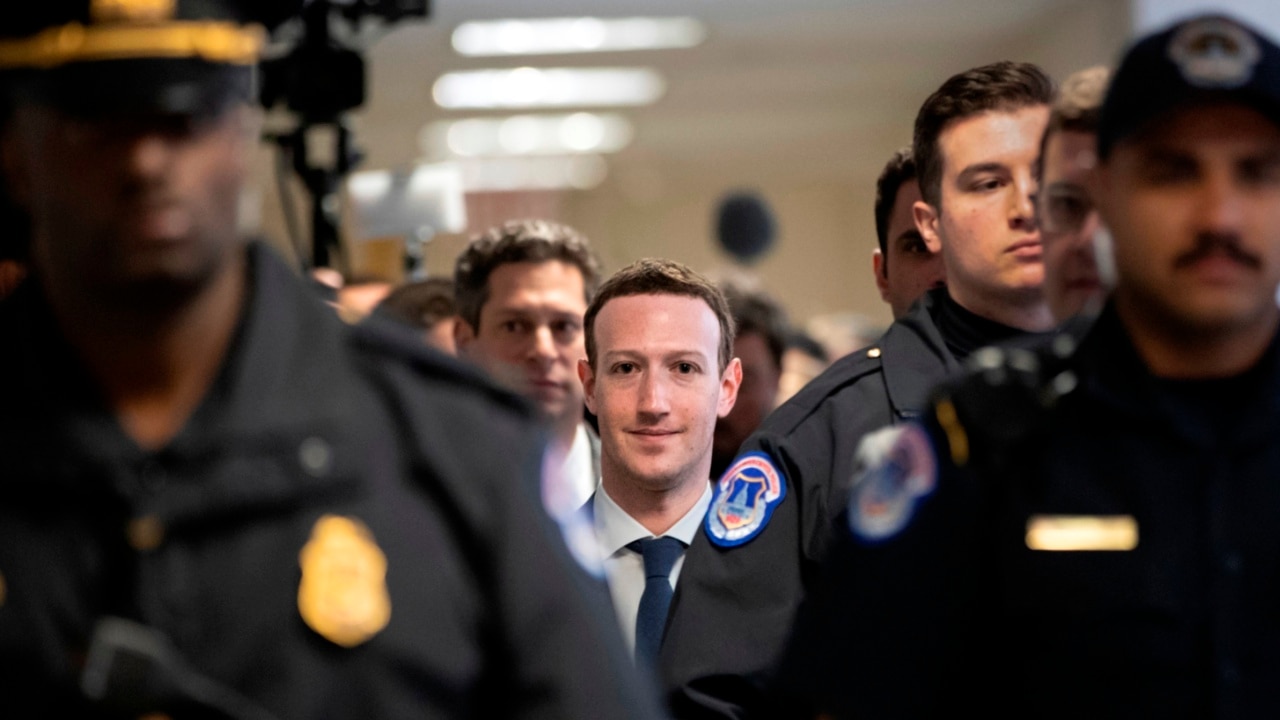
UPDATED: Facebook CEO Mark Zuckerberg has been warned he has an obligation to the world to prevent the ‘American Dream’ of Facebook from turning into a privacy nightmare.
During more than three hours of often testy questioning from US Senators on Capitol Hill, the Facebook founder conceded that his social network was flawed and that fundamental change is required to win back public trust.
“We didn’t take a broad enough view of our responsibility, and that was a big mistake. It was my mistake and I’m sorry. I started Facebook, I run it, and ‘I’m responsible for what happens here,” a contrite Mr Zuckerberg told a packed joint hearing of the Senate Judiciary and Commerce Committees.
In his long-awaited testimony, the 33-year-old billionaire began nervously but became more confident as he tried to explain the stumbles Facebook has experienced and what he plans to do to restore the company’s reputation.
“We are going through a broader philosophical shift in how we view our responsibilities as a company,” he said.
Inside the room several protesters waved signs calling for better protection of privacy, while outside the Capitol stood 100 life-sized cutouts of Mr Zuckerberg wearing a T-shirt saying “Fix Facebook.’
Mr Zuckerberg conceded that self-regulation by Facebook was no longer enough and that he supported targeted laws to better protect privacy and personal data in the social media age.
“My position is not that there should be no regulation. The real question is what is the right regulation,” Mr Zuckerberg said when asked why his company should be trusted to self-regulate.
Mr Zuckerberg, who in past years was opposed to greater government oversight of Facebook, said it was “certainly worth discussing” whether US tech giants should be subjected to stricter privacy laws such as those about to be introduced in Europe.
Senator Bill Nelson, the ranking Democrat on the Commerce Committee told Mr Zuckberg bluntly: “If Facebook and other online companies will not or cannot fix these privacy invasions, then we will.”
During wide ranging testimony Mr Zuckerberg explained the mistakes Facebook had made in relation to content, privacy and transparency.
“It’s clear now that we didn’t do enough to prevent these tools from being used for harm as well,” he told the 44 Senators.
“That goes for fake news, foreign interference in elections, and hate speech as well as developers and data privacy.”
Senator John Thune, Chairman of the Commerce Committee began the hearing by stating that Mr Zuckberg had an obligation to prevent Facebook from becoming a “privacy nightmare.”
“Mr. Zuckerberg, in many ways you and the company that you’ve created, the story you’ve created, represent the American Dream,” Senator Thune said. “At the same time, you have an obligation, and it’s up to you, to ensure that dream doesn’t become a privacy nightmare.”
Mr Zuckerberg conceded that the most of Facebook’s 2.2 billion daily users probably didn’t fully understand what Facebook’s privacy policies were.
“I don’t think that the average person likely reads that whole (Facebook privacy) document,” he said. “But I think that there are different ways that we can communicate that and have a responsibility to do so.”
Texas Republican Ted Cruz accused Facebook of being a politically biased platform which often censored the views of conservatives.
Mr Zuckerberg disputed this, saying: “Our goal is certainly not to engage in political speech...I’m very committed to making sure Facebook is a platform for all ideas.”
Mr Zuckerberg told Senators he had initiated a range of new privacy measures to ensure there was no repeat of the scandal where the data of 87 million users were harvested and then misused by the analytics company Cambridge Analytica.
He conceded that Facebook made a mistake by failing to follow-up with Cambridge Analytica to ensure that the company had fully destroyed the data of users.
“We considered it a closed case,” he said. “In retrospect, that was clearly a mistake. We shouldn’t have taken their word for it.”
Mr Zuckerberg said of Facebook: “It’s not enough to just give people a voice, we have to make sure people aren’t using it to hurt people or spread misinformation.
“It’s not enough to give people control of their information, we have to make sure developers they’ve given it to are protecting it too.”
Mr Zuckerberg also revealed that Facebook employees had been interviewed by the team of Special Counsel Robert Mueller as part of the Russia investigation.
Mr Zuckerberg has conceded that Facebook was too slow to recognize how Russia was exploiting Facebook to try to influence the 2016 US presidential election.
‘I don’t want anyone to use our tools to undermine democracy, that’s not what we stand for,’ he said.
“We were too slow to stop Russian interference and we’re working hard to get better.”
Mr Zuckberg is due to give a second round of testimony early today (early Thurs AEST), this time to the House Energy and Commerce Committees.
Zuckerberg planned for resignation demand
If his notes are any indication, Mark Zuckerberg expected senators to ask whether he’d resign. His notes acknowledge he’s made mistakes and say the company is facing a “big challenge” but will solve this one too. Zuckerberg’s notes were briefly visible to an Associated Press photographer during the hearing.
The bullet-pointed pages include sections on “diversity,” “competition,” and GDPR, the European data-privacy rules that go into effect next month. Zuckerberg’s notes warn him, “don’t say we already do what GDPR requires.” The notes even refer to Tim Cook, the Apple CEO who recently criticized Facebook. One note says there are “lots of stories about apps misusing Apple data, never seen Apple notify people.”
AP
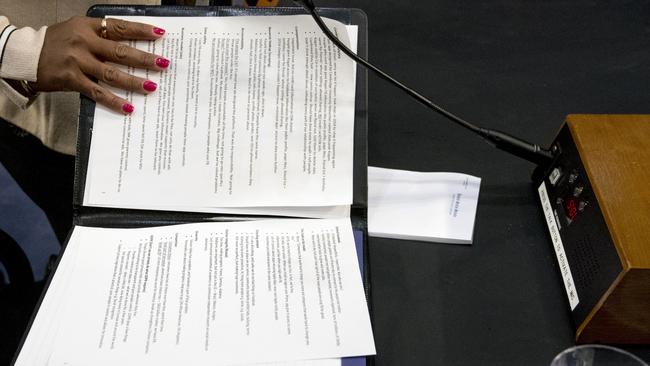
Whose data is it anyway?
Sen. Jon Tester of Montana has asked what Facebook will do to protect people and their data.
Zuckerberg said Facebook can lock down data further. But he also said one change was made, back in 2014, when the company tightened the reins over who could access certain kinds of user data.
If we made the change we did in 2014 earlier, “we wouldn’t be sitting here,” Mr. Zuckerberg said.
But Mr. Tester wasn’t done. He took umbrage at the oft-repeated notion today from Mr. Zuckerberg that people own their data. That’s not really the case when Facebook makes tens of billions of dollars of the information, he said.
“When we say it is your data, we say you have control over it,” Mr. Zuckerberg said.
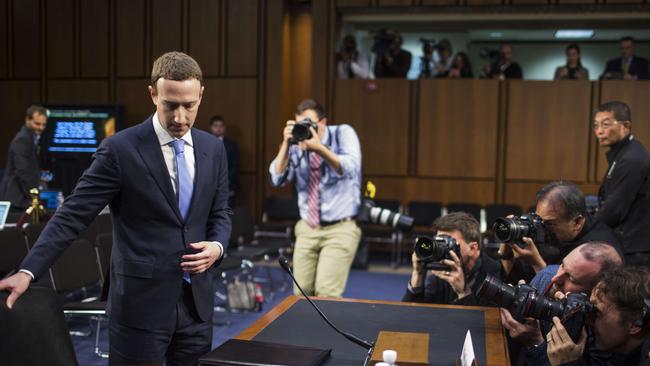
‘Your user agreement sucks’
“Your user agreement sucks,” Sen. John Kennedy (R., La.) told Facebook’s CEO Mark Zuckerberg in the most colorful exchange of the hearing.
Sen. Kennedy repeatedly asked Mr. Zuckerberg about why Facebook doesn’t spell out in simpler terms the kinds of data it collects on its users, to which Mr. Zuckerberg repeatedly told the senator he believes Facebook is already doing what Sen. Kennedy wants.
“I don’t want to vote to have to regulate Facebook, but by God I will,” Sen. Kennedy said.
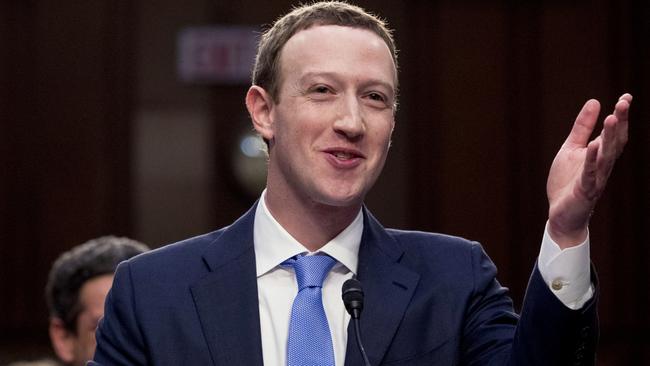
Eavesdropping ‘conspiracy theory’
Sen. Gary Peters (D., Mich.) has channeled the paranoia of people who think Facebook knows everything about its users by asking -- perhaps once and for all -- whether Facebook is tapping into the audio around its users through their phone’s mic to learn about what they are doing and saying.
“You’re talking about this conspiracy theory,” Mr. Zuckerberg said, slightly animated, in response. “We don’t do that.”
Facebook does, however, process the audio from users’ phones when they record videos using Facebook, he said.
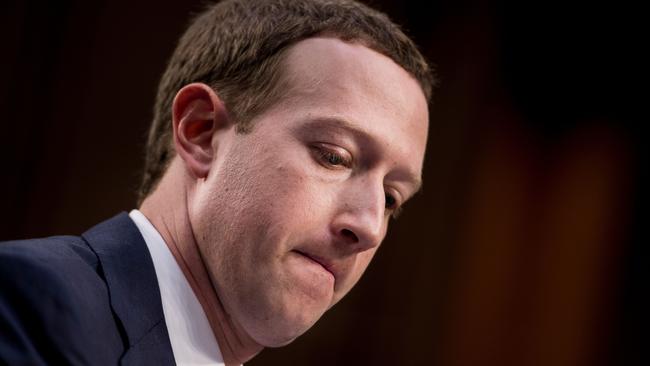
Facebook ‘not a media company’
Mr. Zuckerberg acknowledged Facebook feels responsibility for what is posted on its platform, but repeated his stance that Facebook isn’t a media company.
The CEO has faced questioning in the hearing today -- for years, really -- about whether Facebook should be considered a media company, since so many users get their news from Facebook and the company is forced at times to police what its users post.
“I agree that we’re responsible for the content, but we don’t produce the content,” Mr. Zuckerberg said.
He reiterated his long-held view that Facebook is first-and-foremost a tech company, “because the primary thing we do is build tech and products.”
‘Social media arms race with Russia’
Sen. Tom Udall (D., N.M.) presses Mr. Zuckerberg on whether he can guarantee the service is safe from foreign meddling. Mr. Zuckerberg says he can’t, as there is an arms race going on, and he can’t guarantee that paid Russian agents aren’t continuing to try to meddle. Mr. Zuckerberg makes clear this is a fight that is nowhere near its conclusion.
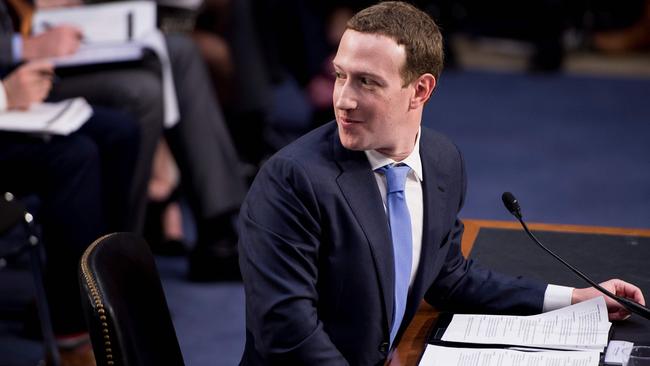
Children’s privacy bill of rights
Sen. Ed Markey (D., Mass.), author of the Children’s Online Privacy Protection Act in 1998, grilled Mr. Zuckerberg over whether enough is done to protect children’s privacy.
He asked the Facebook chief whether there should be a privacy Bill of Rights that children under 16 explicitly opt in to, perhaps with permission received from parents, to have their information reused in a way other than how it was specifically intended.
Mr. Zuckerberg said protecting minors is important but Mr. Markey demanded more -- yes or no to a law?
“I’m not sure we need a law,” Mr. Zuckerberg said.
“I couldn’t disagree with you more,” the senator shot back. “We are leaving these children to the most rapacious commercial predators in the country who will exploit these children unless we absolutely have a law on the books.”
Mr. Zuckerberg insisted the issue is important and would follow up with the senator’s office.
.@SenMarkey: “Would you support a child online privacy ‘Bill of Rights’ for kids under 16 to guarantee that that information is not reused for any other purpose without explicit permission from the parents or the kids?†pic.twitter.com/sexGTFiGyR
— Fox News (@FoxNews) April 10, 2018
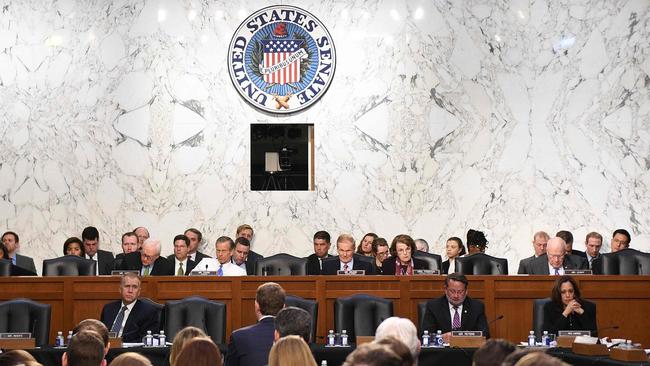
Is Facebook addictive?
Tobacco executives were haunted for decades after saying at a congressional hearing in the 1990s that their product wasn’t addictive. Now, Mr. Zuckerberg is under pressure to answer for whether his own product is habit-forming.
“Do you worry about social-media addiction as a problem for America’s teens?” asked Sen. Ben Sasse (R., Neb.)
Mr. Zuckerberg avoids answering directly. He says that Facebook has studied the effects of its technology on well-being, and without saying whether the platform is addictive, he says that whether it is beneficial depends on whether it is being used to form connections with other people.
“If you’re using the internet and social media primarily to just passively consume content and you’re not engaging with other people then it doesn’t have those positive effects and it could be negative,” he said.
Mr. Sasse asks the question in a slightly different way: does Facebook hire consultants to “figure out how to get more dopamine-feedback loops so people don’t want them to leave the platform?”
“No, senator,” Mr. Zuckerberg says. “That’s not how we talk about this or set up our product teams.”
The Facebook CEO said he wasn’t aware of other social media companies doing that.
Facebook CEO Mark Zuckerberg questioned on his platform's role in Myanmar, where social media has become the new battleground in the fight over Rohingya refugees.
— ABC News (@ABC) April 10, 2018
Watch the full @Nightline report: https://t.co/OEc8DV98o0 pic.twitter.com/GCXwFzKkmZ
Policing content
Political content has taken the spotlight, making clear how fine a line Facebook has to walk.
Sen. Ted Cruz (R., Texas) earlier pressed Mr Zuckerberg on whether Facebook was biased against conservative users and posts. Then, Sen. Chris Coons, a Democrat from Delaware, asked whether Facebook was proactive enough in battling discriminatory ads that may violated fair-housing laws.
Recently up: Sen. Ben Sasse (R., Neb.), who cautioned Mr. Zuckerberg that while some speech issues have broad agreement -- taking down terrorist content, for instance -- debate is valuable on issues where Americans often disagree strongly.
“Adults need to engage in vigorous debate,” says Mr. Sasse. He points to abortion as an issue that Americans feel strongly about. Would Facebook take down anti-abortion posts, because they may upset users? Mr. Zuckerberg says that that kind of post wouldn’t typically violate any policies.
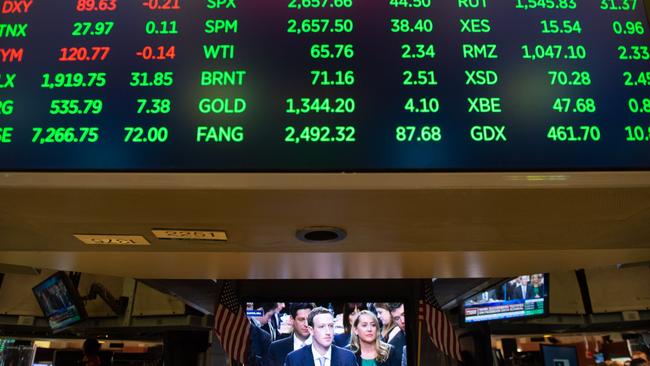
Ted Cruz Facebook’s top Senator
An analysis of Facebook posts published in the past year by 44 committee members found the two most active users, in terms of posts and followers, are New Jersey Democrat Cory Booker and Texas Republican Ted Cruz. Both have carved out national profiles, with Sen. Cruz having run for his party’s presidential nomination in 2016 and Sen. Booker often mentioned as a possible Democratic presidential candidate.
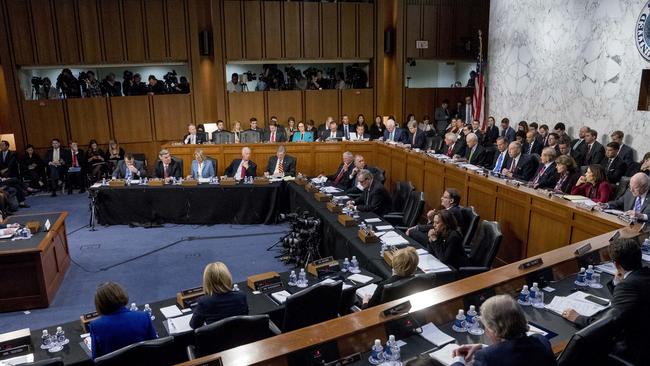
With an average age of 62, the senators interviewing Mr. Zuckerberg skew older than the average Facebook user, yet some of the oldest politicians post as much as their younger colleagues: Sen. Ed Markey, 71, published 628 posts or nearly as many as 48-year-old Sen. Booker since April 2017. On average, senators posted a publicly viewable link, photo, video or status update less than once a day, according to The Wall Street Journal’s analysis.
Social-media users tend to skew younger but tech platforms are increasingly serving an older audience. Just 2% of adults 65 and older used social media in 2008, according to the Pew Research Center. Today that figure sits at 37%.
Still, some of the least-frequently-posting senators are getting the most comments on average. Followers of Sen. John Cornyn (R., Texas) were more vocal than any other senators largely about two divisive political topics: the Affordable Care Act and the tax overhaul.
Number of comments is a common measure of engagement and the average number of messages among the 44 lawmakers’ Facebook posts was 223. A total of 18 senators received fewer 100 comments per post on average in the past year, according to the Journal’s analysis.
Sen. Booker is also a favorite among Facebook employees and the company’s political-action committee -- receiving nearly $45,000 in campaign contributions, the most among Senate Judiciary and Commerce committee members, since the 2007-08 election cycle from those sources. California Sen. Kamala Harris ranks second at more than $30,000.
‘Willful blindness over Cambridge Analytica’
Sen. Richard Blumenthal went head to head against Mr Zuckerberg over whether Facebook should have caught the data Cambridge Analytica improperly obtained, suggesting the failure could violate an agreement Facebook has with the Federal Trade Commission.
“What happened here was in effect willful blindness -- it was heedless and reckless,” Sen. Blumenthal said.
Back in 2012, Facebook agreed to obtain user consent for collecting personal data and sharing it with others. The FTC is now probing whether Facebook violated the terms of this agreement when data of tens of millions of its users were transferred to Cambridge Analytica.
‘Where did you stay last night?’
In pointed questioning, Senator Dick Durbin asks Mr Zuckerberg if he is willing to share with Congress the name of the hotel he stayed in last night, and the names of the people he ahs been messaging with.
The senator’s blunt personal questions of Facebook CEO Mark Zuckerberg were designed to underline a point about the right to privacy.
After a pause and a bit of a chuckle rising from the audience in the Senate hearing room, Mr. Zuckerberg answered “no” to each question.
Sen. Durbin said the issues Facebook faces are “all about” the right to privacy and the limits of privacy and how much people give up to be connected to each other.
Mr. Zuckerberg responded that “everyone should have control over how their information is used.” He added that users control how much they share publicly about the information and photos they post to the service.
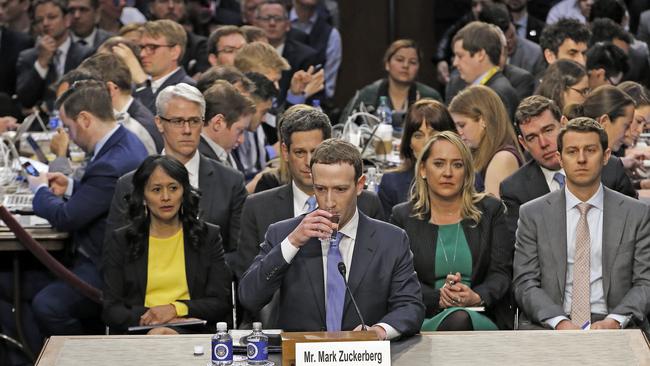
Mark #Zuckerberg: “I think everyone in the world deserves good privacy protection.†https://t.co/Il5feaxDRW pic.twitter.com/ILgTZtpBf2
— Fox News (@FoxNews) April 10, 2018
‘Do you have a monopoly?’
Sen. Lindsey Graham of South Carolina, a colorful speaker, says that if consumers have a problem with their Ford car, they can buy a Chevy next. He asks whether Facebook users have such alternatives.
“Is there real competition you face?” he asks.
After Mark Zuckerberg says that the average American uses eight different apps to stay in touch with their friends, Mr. Graham drops the metaphors and gets straight to the point.
“You don’t think you have a monopoly?” he asks -- a line of questioning that could potentially open up all sorts of intervention from antitrust regulators.
“It certainly doesn’t feel like that to me,” Mr. Zuckerberg replies.
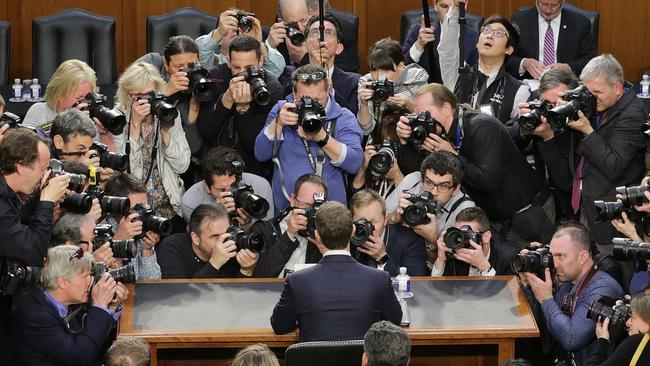
Cambridge Analytica defends itself
Cambridge Analytica is watching Zuckerberg’s testimony too. The data firm hit back at comments in the hearing saying the company had improperly obtained information about Facebook’s users ahead of the 2016 U.S. election.
“We did not hack Facebook or break any laws,” Cambridge Analytica said in a post on Twitter. Instead, the firm said SCL Elections, its politics division, licensed data from a company that obtained the data via a tool provided by Facebook -- something that was “a common practice at the time,” Cambridge said.
Cambridge Analytica said it deleted thee data when Facebook said it violated its terms of service, and that an independent audit is working to verify this.
We did not hack Facebook or break any laws – SCL Elections licensed data from a research company called GSR which obtained the data via a tool provided by Facebook, a common practice at the time.
— Cambridge Analytica (@CamAnalytica) April 10, 2018
Cambridge Analytica did no work on the Brexit referendum in Britain. We pitched our services to leave and remain groups but did no work for them.
— Cambridge Analytica (@CamAnalytica) April 10, 2018
‘Not enough to give a voice’
In his first ever testimony on Capitol Hill the besieged founder of the social network conceded that Facebook did not take a broad enough view of its social responsibilities.
“It’s clear now that we didn’t do enough to prevent these tools from being used for harm as well,” he told a packed joint hearing of the Senate Judiciary and Commerce Committees on Capitol Hill today.
“That goes for fake news, foreign interference in elections, and hate speech as well as developers and data privacy.
“We didn’t take a broad enough view of our responsibility, and that was a big mistake. It was my mistake and I’m sorry. I started Facebook, I run it, and ‘I’m responsible for what happens here.”
Mark Zuckerberg: “After the 2016 election, our top priority was protecting the integrity of other elections around the world.†pic.twitter.com/0yvhE8OHbK
— Fox News (@FoxNews) April 10, 2018
Under questioning, Mr Zuckerberg said that he would support some forms of legislative regulation on Facebook.
“One is around having a simple and practical set of ways that you explain what you do with data,” Mr Zuckerberg said.
He also said he would support legislative measure that helped give people “complete control of their data.”
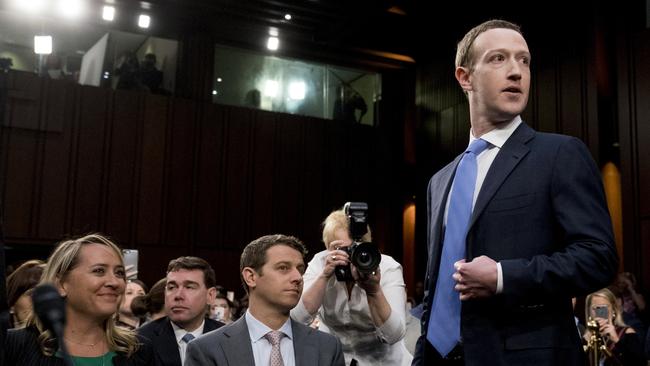
He also confirmed that special counsel Robert Mueller’s team has interviewed the Facebook staff about Russian meddling in the 2016 election.
Mr Zuckerberg said his employees have spoken to the Mueller team, but he has not personally been interviewed.
“I want to clarify, I’m not sure we have subpoenas. I know we’re working with them,” Mr Zuckerberg said.
Facebook CEO Mark Zuckerberg says "there may be" subpoenas from special counsel Robert Mueller's office, but that he has not been interviewed by the special counsel's team.
— ABC News (@ABC) April 10, 2018
"I know we're are working with them." https://t.co/V41gBaclMU pic.twitter.com/0dMQ3VnwNs
He outlined a range of initiatives that Facebook has introduced to try to prevent a repeat of the problems which have included the harvesting of the data of 87 million users by voter data firm Cambridge Analytica.
He said the company now realised it was not enough just to connect people through Facebook and assume that nothing bad will happen.
“It’s not enough to just give people a voice, we have to make sure people aren’t using it to hurt people or spread misinformation,” he said.
“It’s not enough to give people control of their information, we have to make sure developers they’ve given it to are protecting it too.
“Across the board, we have a responsibility not just to build tools but to make sure those tools are used for good.’
But Mr Zuckerberg warned that those changes would take time to implement.
“There is more to do and we need to step up and do it.”
Facebook CEO Mark Zuckerberg: "There will always be a version of Facebook that is free." https://t.co/QkyAEbKng1 pic.twitter.com/r0d6R1bJsA
— ABC News (@ABC) April 10, 2018
As he opened the hearing, the Chairman of the Senate Commerce Committee, Republican John Thune, told Mr Zuckerberg ‘we are here because of what you Mr Zuckerberg have described as a breach of trust.”
He told Mr Zuckerberg that Facebook’s remarkable growth in many ways seemed to epitomise the American Dream.
“(But) you have an obligation that that dream doesn’t become a privacy nightmare of the scores of people who use Facebook,” he said.
“We are listening, America is listening, quite possibly the world is listening too.’
The rating Democrat on the Commerce Committee Senator Bill Nelson told Mr Zuckerberg “if you do not get your act in order, none of us are going to have privacy anymore.’
Mr Zuckerberg tried to explain to the Committees how it was that the data of 87 million users were harvested by Cambridge Analytica.
Mark Zuckerberg answers whether he’d do things differently in the wake of the Cambridge Analytica data scandal. pic.twitter.com/B3OlLsanFy
— HuffPost (@HuffPost) April 10, 2018
He told Senators that he regretted the fact that Facebook had failed to inform users that their data had been compromised when the company first learned about it in 2015.
Mr Zuckerberg outlined to Congress the series of reforms which the company has made in recent weeks to avoid a repeat of the massive misuse of data.
These include restricting the data that developers can access and giving users more understanding and greater control of their own data.
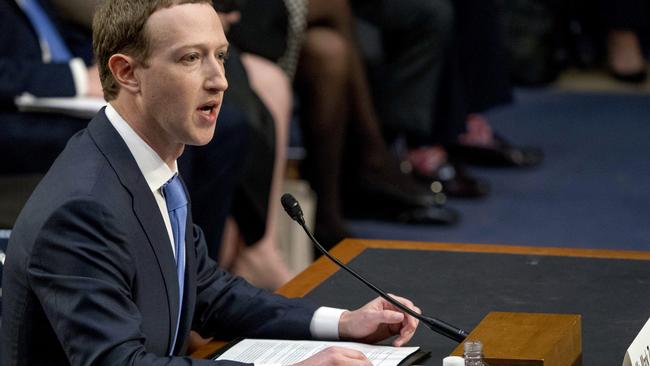
On the controversy over Russia’s exploitation of Facebook to try to influence the 2016 US presidential election, Mr Zuckerberg admitted that Facebook had failed.
“I don’t want anyone to use our tools to undermine democracy, that’s not what we stand for,” he said.
“We were too slow to stop Russian interference and we’re working hard to get better.”
He said reforms to prevent a repeat of such abuse include tighter controls and greater transparency of those groups that seek to run political or ‘issue’ ads on Facebook.
Cameron Stewart is also US Contributor for Sky News Australia
With Dow Jones






